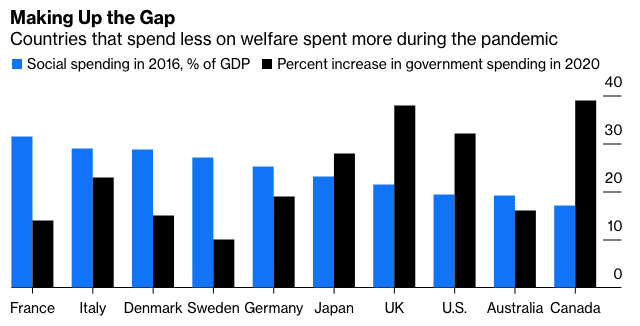Maybe such fat checks wouldn’t have been as necessary if the country had a more robust support system for its people.
Opinion by Noah Smith
Americans are strongly in favor of a very large Covid-19 relief bill. It seems likely that this enthusiasm reflects more than just anxiety over the pandemic; many Americans are fed up with decades of a stingy welfare state, and in this crisis they finally see an opportunity to make back some lost ground.
A recent report by McKinsey & Co. found that countries that generally spend less on social welfare ended up increasing their government spending by more during the pandemic. A look at the data shows this relationship fairly clearly:

The Anglosphere countries — the U.S., U.K., Australia and Canada — tend to do substantially less social spending than European countries like France, Germany and Sweden in normal times. But the U.S., UK, and Canada boosted their spending much more in 2020 than those other countries (Australia did less, but probably just because it wasn’t hit as hard by the virus).
Thus, the pandemic relief package was so big precisely because it had to be — there was not as much of a pre-existing safety net to catch Americans when they lost income due to the pandemic.
Not surprisingly, a recent Quinnipiac Poll showed 68% in support of President Joe Biden’s new $1.9 trillion relief proposal.
The most popular spending measure, according to a recent YouGov survey, is the broadest one: a one-time payment of $2,000 per family member. Biden’s actual proposal calls for an additional $1,400 on top of the $600 already allocated in the December relief bill.
Although some on the political left are demanding much more, $2,000 per person is actually a lot of money. Real income per capita in 2020 was only $2,300 lower than in 2019. Thus, a $2,000 payout to every person in America, combined with the previous $1,200 payout in the Cares Act, would more than cancel out the entire 2020 income loss from the pandemic, on average.
Of course that’s just an average. Many people have suffered far worse drops in income, usually as a result of unemployment. But remember that the cash handouts are far from the only form of relief.
There’s also the special pandemic unemployment benefit, which was so generous that poverty actually fell during the darkest early days of the pandemic. There were also supports for businesses to keep workers on payroll, as well as various other forms of aid. Globally, the U.S. has been above average in its generosity with overall aid during the pandemic, and Biden’s bill would move us further up the rankings.
The very generosity of the Cares Act seems to have awakened something in the American psyche. It was the most transformative, effective government social program since the creation of Medicare in 1966. And it was so simple: the government just gave people a bunch of cash. It appears to have vindicated the refrain of those who have been calling for the U.S. to increase the welfare state by adding direct cash benefits rather than expanding the typical thicket of vouchers and conditional aid.
People want more.
After decades of cuts to welfare programs, austerity in the middle of recessions, and hectoring lectures about how the American people don’t deserve government bailouts, the Covid-19 relief effort has finally helped Americans to realize that the government can just send them cash, and that this makes their life better.
They’re not ready to stop at a measly $1,200.
And yet while helpful in the short run, cutting Americans $2,000 checks won’t fix the underlying problem of the welfare state. If the U.S. is going to add cash benefits to the current mix of government rograms, it needs to add them on an ongoing basis. This is what Biden’s child tax credit proposal and Senator Mitt Romney’s even more generous counter-proposal are all about.
Though it’s not quite a universal basic income, these cash payments — $3,000 to $4,200 per year for each child in a family — would be very widely targeted.
They represent the country’s best shot at the dream of a bigger but simpler welfare state. So one-time $2,000 checks are fine, but child tax credits would be a much more enduring way of giving Americans a boost.
_____
To see original article please visit: https://www.bloomberg.com/opinion/articles/2021-02-10/covid-stimulus-shows-the-inadequacy-of-america-s-welfare-state




















